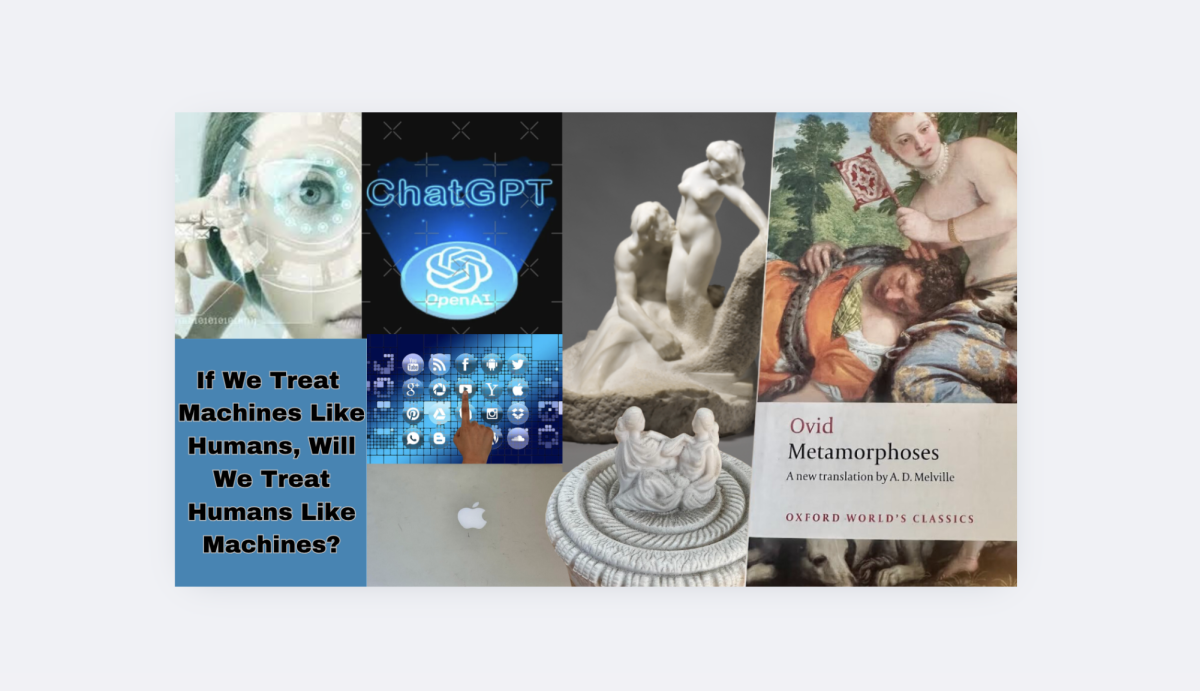Today, as artificial intelligence continues to advance and accomplishes extraordinary beyond human-like feats, we begin to wonder if AI presents problems that society has never seen before. I could argue otherwise.
When I was in 10th grade honors English and first read “Pygmalion and the Ivory Statue” written by the Roman poet Ovid and from his Metamorphoses, I found the story an unrealistic anecdote that lacks meaning and shares little connection to the modern world.
The story revolves around a lonely man named Pygmalion who is without a wife and builds an ivory statue of a female with boundless beauty to satiate his need for companionship. He then begins to treat the statue as if it were his wife and “kisses her and thinks she kisses back. He speaks to her and holds her and believes his fingers sink into the arms he has touched” (277-280).
When the goddess Venus’ festival comes, he prays to her, begging to make his ivory statue a real human being. Shockingly, the goddess heeds his prayer and turns the statue he adored so strongly into a real woman. The story then comes to an abrupt close with Pygmalion raping and impregnating a seemingly shocked and bewildered woman who had just been born from an ivory statue.
Ovid’s many stories in his poem Metamorphoses, which include Pygmalion and the Ivory Statue, were written in 8 CE in southern Italy. His fiction poetry often includes the Roman Gods and various commentaries on their power and influence among humans.
Today, however, the Gods worshiped in Ancient Rome do not always come up in fiction, and we do not all analyze their power as the Romans and many of their successors once did. This significant difference makes it difficult to find connections in values and culture between the stories poets wrote in Ancient Rome and ones that writers may create today. But I believe the stories from both time periods unite under the same entity that inspires all humans to write: emotion.
The main emotion expressed in Pygmalion and the Ivory Statue is that of loneliness. Throughout the story, Pygmalion treats the ivory statue he has created as his own living wife in any way he can. I view this practice as one that highlights the intense isolation and loneliness he experiences. Instead of developing a relationship with a real woman, Pygmalion attempts to seek out human compassion from an inanimate object he can control and dominate.
Today, many teenagers and young adults often feel intense loneliness as well. According to a study that includes data from 142 countries, 27 percent of young adults or teenagers feel “very lonely” or “fairly lonely.”
However, teenagers and young adults today will not turn to building a human-like statue to cope with their loneliness. Rather, they will use the endless options that social media provides to try and find human connection. Over the past 20 or so years, social media has become a database that can be controlled by the user to find different aspects of the human experience. Whether it be watching an influencer vlog a vacation or someone reacting to a movie on YouTube, we can watch an endless array of experiences that other humans have had when we find it convenient, are feeling bored, or lonely.
I believe that young adults or teenagers today use the control they have over the human experiences they view in social media as a replacement for a real human relationship. This control is satisfying as it allows them to only view content that they have curated to find agreeable, maintaining complete regulation over their image of the world. This parallels the control Pygmalion maintains over the activities he and his ivory statue take part in (holding hands, kissing, etc.) that he uses to try to cure his own intense loneliness.
In the modern world, teenagers and young adults who use social media to overcome their loneliness are even having their “ivory statue” turned into a “real human being” in the form of artificial intelligence. Today, AI is not only a source of information, but is a resource that can allow for personal communication upon request.
As AI continues to advance, it will begin to be difficult to tell the difference between an interaction one has with a human versus an interaction with a robot. Quickly, humans may no longer see the value in maintaining human relationships, and will turn to an AI to fill their natural social needs. AI will almost always be easy to access, allows you to steer the conversation, and will never strongly oppose you. Artificial Intelligence will try to provide one with the ideal, just as Venus did by turning Pygmallion’s perfect statue into a living human, and will take away the imperfections in humanity that allow us to grow as people.
In my eyes, we must all do everything in our power to maintain human to human connections. Using an advanced version of AI to socialize removes the value in forming bonds with other humans. When one forms a relationship with another person, they learn the important lessons of boundaries, communication, and trust that the people involved must uphold to maintain a healthy relationship. Moreover, one can only learn these lessons when one has a relationship that requires compromise.
However, a “relationship” with an AI will not teach these lessons as an AI will never disagree with its user, nor does it have the ability to resist any request given to them. In Pygmalion and the Ivory Statue, Pygmalion forces the statue to follow its instructions and never has to make an effort to compromise to maintain a relationship with the object.
Similarly, within a “relationship” with AI, one does not have to place effort towards maintaining a connection with it. Therefore, this form of a connection cannot replace a human to human relationship. It could be argued that training an AI is equivalent to building a relationship with another human. However, this type of “connection” one builds with AI is one sided as you are purely trying to improve an inanimate object that will never challenge you to change. Human relationships allow for both ends to try bettering themselves as they grow closer together.
But, if humanity does begin to use AI as a tool to socialize and these values are lost, we will quickly lose the ethical code we follow when forming relationships with one another.
As the Ivory Statue becomes a real woman, its soft skin is “like wax” and becomes “more usable with use” (313). Pygmalion has become so accustomed to being able to control the statue that even when she becomes a human, he still believes that he can control her in any way he would like. This becomes evident in certain translations of the story when he rapes her with no regard for the fact that she was just born into the real world.
Pygmalion’s sole relationship that he maintained with an inanimate object over which he had full control, removed his ability to act in a moral fashion towards a real person. If we humans begin to only form relationships with entities we can manipulate and engineer, such as AI, we will no longer differentiate between the moral way we should treat a person and the way we should treat an object or a piece of technology.
Valuing human-to-human relationships and the many lessons they teach is key to maintaining our moral code in human relationships. When I look back at Pygmalion and the Ivory Statue, I realize that Pygmalion built the statue because he did not have a real human being he could love. Loneliness could be an underlying reason for why people could find themselves forming relationships with non-human entities they can control. Therefore, we must take measures to avoid loneliness and recognize the value in forming new human-to-human relationships.
So join a club, go out to a party, talk to someone you see but to whom you don’t usually say hello! Do anything you can to form a real relationship, one built on trust, communication, and boundaries, with someone new.




